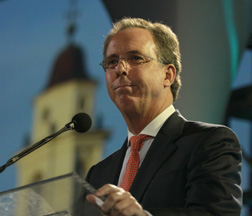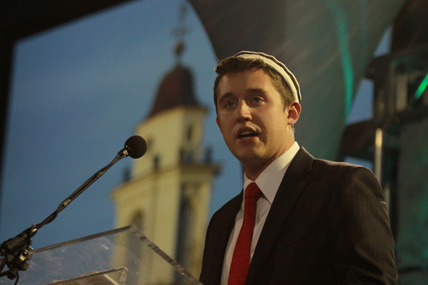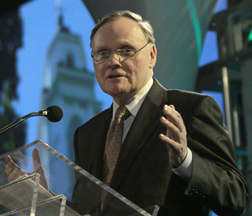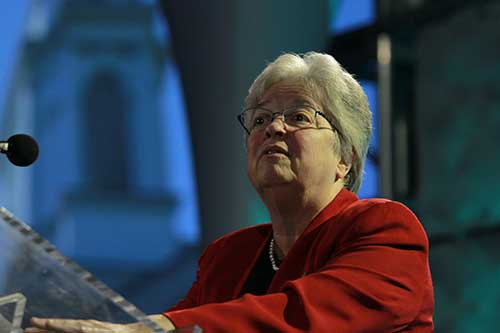The Wabash College community gathered Friday to celebrate the College’s rich tradition of philanthropy. The occasion was the formal kickoff of the Challenge of Excellence, a five-year $60 million major gifts initiative that will focus on the four primary elements of Wabash’s strategic plan.
.jpg)
And when Challenge of Excellence co-chair Ted Grossnickle ’73 announced that nearly $36 million has been raised to date, there was much to celebrate.
“We have here tonight a gathering of generations of men and women who have committed themselves to our noble mission,” said Grossnickle when he gave a toast to continued success. “We honor the past, celebrate the present and prepare for the future. The Challenge of Excellence will pave the way for that future.”
The goals of the
Challenge of Excellence include raising funds for scholarships and financial aid for worthy students; support for faculty recruitment and development; expanding Wabash’s immersion learning and study abroad opportunities; and enhancing career development programs, including the Business Leaders Program.
“The Challenge of Excellence will not be easy,” said President Pat White in his remarks. “In colleges all over the country alumni and friends are replying to requests for support [by saying], ‘No thanks,’ ‘can’t now,’ ‘hard times.’
“But at Wabash, alumni and friends of the College and their families are rising to the challenge of excellence, even in these difficult times. All of you know the difference a Wabash education makes in this world... I know you all will rise to the challenge, and when you do, you will show your commitment to excellence at Wabash and you will change the lives of Wabash students forever.”
Friday’s kickoff event featured a range of student, faculty, and alumni speakers, as well as
video presentations focused on the goals of the Challenge of Excellence.
Allan Anderson ’65, who is co-chair, paid tribute to the
Challenge of Excellence steering committee, which includes Grossnickle, Stephen Bowen ’64, Kevin Clifford ’77, Greg Castanias ’87, Kip Chase ’03, G. Michael Dill ’71, Thomas Hays ’55, David Orr ’57, Fred Wilson ’69, professors Dan Rogers and Kealoha Widdows, President White, and Dean for Advancement Joe Emmick ’92.

Clifford
(left) took great pride in thanking the leadership donors to the Challenge of Excellence, men, women, and foundations whose gifts have totaled $35,625,000 in the “quiet phase” of the initiative. He also announced that Trustees already have committed more than $20 million to the effort.
The evening was broken up into four parts with two speakers and short video presentations for each of the four Challenge of Excellence initiatives.
Dean Emmick introduced a video on scholarships, and told his own story of how scholarships and financial aid enabled him to receive a transformative education at Wabash.
“Thanks to my high school guidance counselor, Wabash became my number one college choice,” Emmick said. “My parents believed strongly in their sons' educations and were willing to invest in them; however, our family did not have the means to invest in Wabash education. A President's Scholarship in 1988 made my Wabash education possible and it transformed my life.”

Immediately following that video, Sphinx Club President Jake German ’11
(right) spoke on behalf of the students, first thanking the College’s alumni and friends for their generosity. He also announced that the Senior Council and several campus organizations had made a $10,000 gift to support student scholarships, and he challenged the student body to help meet a goal of $25,000 for the effort.
“I challenge the men of Wabash,” German said. “Your generous contributions to the Challenge of Excellence are the gateway to the next generation of successful Wabash men. Through your gifts, we will guarantee the passing of the bell to future loyal sons of Wabash.”
Then, quoting the College’s fight song, Old Wabash, with a twist, German said, “When College days are past, as long as life shall last, our greatest joy will be… to ensure a legacy of Wabash men.”
If financial aid for excellent students is the Challenge of Excellence’s highest priority, funds to support faculty come in a very close second. Board of Trustees Chair Steve Bowen (below left) talked about the professors of his own time at the College, and said Wabash faculty always have been difference makers.

“It is no exaggeration to say that my classmates and I had the highest regard for the professors who taught us here,” Bowen said. “These were professors who challenged us and pushed us; who didn't let up until they got our best out of us; who broadened our horizons; who changed our lives.”
In a video presentation, Dean of the College Gary Phillips described faculty development — in all its form — as critical to the long-term health of the College and success of its students.
“To be supporting in the professional development of young faculty — to invest in that capital — is to invest in the long term; it’s like growing the endowment,” Dean Phillips said. “You are enabling the next generation and future generations of Wabash men to benefit from that experience.”
Tough economic times have made faculty recruitment extremely competitive. Chemistry Professor Scott Feller, who chairs Division One, is involved in most faculty searches, and he told the gathering that now is a critical time for Wabash to raise funds for faculty salaries and benefits. He said that when hiring for tenure track positions, Wabash must always seek, as President White says, “the rainmaker.”
“It’s not good enough to settle for adequate,” Feller said. “Our job is to find that exceptional woman or man with a passion for teaching and for learning, who seeks to engage our students and to transform them. Unfortunately, at this moment in time, other colleges and universities are doing the same thing; the competition is stiff for those few exceptional individuals.”
Political Science Professor Melissa Butler (below left) has been a staunch advocate of international studies during her 35-year tenure at the College, and she was an early pioneer of interdisciplinary immersion learning courses.

“I’ve accompanied Wabash students to the shores of the Adriatic Sea and the heart of the Amazon jungle,” she said. “I’ve traveled with some students as they took their first airplane trip. I’ve seen the light bulb go on and the faces light up when suddenly young men realize they are surrounded on all sides by peoples, products, and practices they’ve been reading about for weeks or months or years. I’ve watched students grow in confidence about their ability to operate in a new cultural context.”
Trustee David Shane ’70 told the crowd of over 400 that he and his wife, Anne, have invested in the Challenge of Excellence to support immersion learning and study abroad.
“The power of Wabash always has been, still is, and should be in the learning of committed students in the liberal arts, enabled by their engagement with the dedicated faculty who teach them, occurring in pursuit of the effective and committed life,” Shane said. “The immersion learning and study abroad programs are one important aspect of that caring crucible.”
.jpg)
The fourth element of the Challenge of Excellence is focused on career development. Dean of Students Mike Raters ’85
(right) introduced a video on the Schroeder Center for Career Development and its programs, but before doing so, issued a challenge to those in attendance.
“Our last campaign was the catalyst for a transformation in the programs, funding, and opportunities the Schroeder Center provides our students,” Dean Raters said. “The Schroeder Center became a jewel of the College, a hub of student-faculty-staff-and alumni engagement with a nationally recognized program.
“We cannot, though, rest on our laurels, as we have current and future students still to serve. Resources are necessary to sustain, make permanent, and create more of these opportunities for our bright and eager young men."
.jpg)
Trustee Mike Dill
(left), who established the Dill Internship fund in Wabash’s last capital campaigned, talked about why he continues to invest in career development opportunities for students, including his newly established Small Business Internship grants.
“These internships, whether they’re in Greece, Spain, Mexico, or even New York, help students see the world through a new lens,” Dill said. “I submit that the real value of internships is not so much academic content, but the increased confidence the students have in themselves.”
In wrapping up his remarks, Chairman Bowen issued a special message to Wabash’s alumni. “It is important that we support our College,” he said.
”In doing so, we are reminded that Wabash is not of our own making. It is the creation of others. For a brief period of time, it was given to us, and as students we took full advantage of all it had to offer, as we were encouraged to do. It is up to us, I think, to pass the on the College, better than we found it, to those who come after us. This is what the Challenge of Excellence is about, and I encourage all of you to join us in this work.”
.jpg) And when Challenge of Excellence co-chair Ted Grossnickle ’73 announced that nearly $36 million has been raised to date, there was much to celebrate.
And when Challenge of Excellence co-chair Ted Grossnickle ’73 announced that nearly $36 million has been raised to date, there was much to celebrate..jpg)
 Clifford (left) took great pride in thanking the leadership donors to the Challenge of Excellence, men, women, and foundations whose gifts have totaled $35,625,000 in the “quiet phase” of the initiative. He also announced that Trustees already have committed more than $20 million to the effort.
Clifford (left) took great pride in thanking the leadership donors to the Challenge of Excellence, men, women, and foundations whose gifts have totaled $35,625,000 in the “quiet phase” of the initiative. He also announced that Trustees already have committed more than $20 million to the effort.  Immediately following that video, Sphinx Club President Jake German ’11 (right) spoke on behalf of the students, first thanking the College’s alumni and friends for their generosity. He also announced that the Senior Council and several campus organizations had made a $10,000 gift to support student scholarships, and he challenged the student body to help meet a goal of $25,000 for the effort.
Immediately following that video, Sphinx Club President Jake German ’11 (right) spoke on behalf of the students, first thanking the College’s alumni and friends for their generosity. He also announced that the Senior Council and several campus organizations had made a $10,000 gift to support student scholarships, and he challenged the student body to help meet a goal of $25,000 for the effort. “It is no exaggeration to say that my classmates and I had the highest regard for the professors who taught us here,” Bowen said. “These were professors who challenged us and pushed us; who didn't let up until they got our best out of us; who broadened our horizons; who changed our lives.”
“It is no exaggeration to say that my classmates and I had the highest regard for the professors who taught us here,” Bowen said. “These were professors who challenged us and pushed us; who didn't let up until they got our best out of us; who broadened our horizons; who changed our lives.” “I’ve accompanied Wabash students to the shores of the Adriatic Sea and the heart of the Amazon jungle,” she said. “I’ve traveled with some students as they took their first airplane trip. I’ve seen the light bulb go on and the faces light up when suddenly young men realize they are surrounded on all sides by peoples, products, and practices they’ve been reading about for weeks or months or years. I’ve watched students grow in confidence about their ability to operate in a new cultural context.”
“I’ve accompanied Wabash students to the shores of the Adriatic Sea and the heart of the Amazon jungle,” she said. “I’ve traveled with some students as they took their first airplane trip. I’ve seen the light bulb go on and the faces light up when suddenly young men realize they are surrounded on all sides by peoples, products, and practices they’ve been reading about for weeks or months or years. I’ve watched students grow in confidence about their ability to operate in a new cultural context.”.jpg) The fourth element of the Challenge of Excellence is focused on career development. Dean of Students Mike Raters ’85 (right) introduced a video on the Schroeder Center for Career Development and its programs, but before doing so, issued a challenge to those in attendance.
The fourth element of the Challenge of Excellence is focused on career development. Dean of Students Mike Raters ’85 (right) introduced a video on the Schroeder Center for Career Development and its programs, but before doing so, issued a challenge to those in attendance..jpg) Trustee Mike Dill (left), who established the Dill Internship fund in Wabash’s last capital campaigned, talked about why he continues to invest in career development opportunities for students, including his newly established Small Business Internship grants.
Trustee Mike Dill (left), who established the Dill Internship fund in Wabash’s last capital campaigned, talked about why he continues to invest in career development opportunities for students, including his newly established Small Business Internship grants.